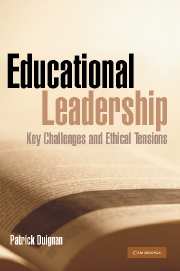Book contents
- Frontmatter
- Contents
- Acknowledgements
- Introduction and overview
- 1 Contemporary leaders and leadership under the spotlight
- 2 Key challenges for educational leaders
- 3 Leadership challenges as tensions
- 4 A framework for analysing tensions
- 5 Values and ethics in decision-making
- 6 A method for ethical decision-making
- 7 Shared and distributed leadership in schools
- 8 Why we need capable educational leaders
- 9 Why we need authentic educational leaders
- 10 Forming capable and authentic educational leaders
- References
- Index
10 - Forming capable and authentic educational leaders
Published online by Cambridge University Press: 05 June 2012
- Frontmatter
- Contents
- Acknowledgements
- Introduction and overview
- 1 Contemporary leaders and leadership under the spotlight
- 2 Key challenges for educational leaders
- 3 Leadership challenges as tensions
- 4 A framework for analysing tensions
- 5 Values and ethics in decision-making
- 6 A method for ethical decision-making
- 7 Shared and distributed leadership in schools
- 8 Why we need capable educational leaders
- 9 Why we need authentic educational leaders
- 10 Forming capable and authentic educational leaders
- References
- Index
Summary
Given the nature of the challenges and tensions discussed in chapters 2 and 3, principals and other educational leaders in schools will, I believe, need to be supported and developed in special ways. The short cases presented in chapter 3 represent many of the daily challenges and tensions faced by educational leaders in schools. As was discussed earlier, resolving such tensions calls upon more than an educational leader's knowledge and skills; it requires the application of good judgement, intuition and wisdom, as well as logic and reason. As was evident from the conclusions in Marks' (2002–03) research reported in chapter 8, many contemporary competency-driven leadership development programs do not prepare educational leaders for decision-making involving contestation of values and ethical tensions.
In chapters 7, 8 and 9, I suggested that educational leaders need to have the capacity to share their leadership responsibilities with other key stakeholders in their school communities; develop their leadership capabilities both as individuals and as professionals; and practice authentic leadership, especially by being present to and for others in their school community. Educational leadership development programs (e.g. short courses and mentoring), as currently constituted, indicate a genuine commitment to the continuous improvement of leadership practice in schools, but if we wish to create organisations that are alive with shared and distributed leadership and leaders who are capable of leading in tension-filled, ethically-charged situations, a more holistic perspective of what constitutes leadership preparation and development needs to be generated and implemented.
- Type
- Chapter
- Information
- Educational LeadershipKey Challenges and Ethical Tensions, pp. 142 - 163Publisher: Cambridge University PressPrint publication year: 2007



